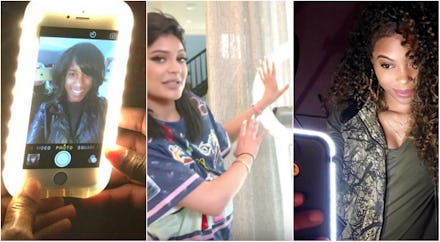If You're Not Using a Selfie Light Already, You Probably Will Be Soon

When future history books look back at the selfie generation, they will have at least two artifacts to represent the era: selfie sticks and selfie lights.
Yes, selfie lights. Taking a picture of your own face has become popular enough that a whole host of props and settings have been created to perfect these shots: our phone cameras flip around, extendable sticks help us take the best-angled photos, and now, special lights have been created for the sole purpose of taking better photos of ourselves.
Don't have plans to get one? You might have said that about the selfie stick.
The extendable selfie stick — that insanely obnoxious tourist gadget known for creating unnecessary pedestrian traffic and angry locals— rose to popularity starting in 2010, when the iPhone debuted a self-facing camera, and shot to popularity more recently. Selfie lights only started appearing around late 2014.
If the selfie stick helps you get the best angle, a selfie light helps you get the best light, just like how professional photographers search for the best lighting for their shots. In most instances, selfie lights come in the form of a smartphone case featuring tiny lights around the frame.
Not surprisingly, one of the first of these illuminated phone cases was created by a professional photographer, Allan Shoemake. Shoemake initially created LuMee not for selfies specifically; he wanted to see his daughter better when she FaceTimed him from her poorly lit dorm room. But the lit-up case ended up being an obvious tool for photos, too.
"I'm a photographer by trade, so I've been around makeup mirrors my whole career," Shoemake told Mic. "You'd always go in the makeup room to see if the models were ready. You'd see that those lights [around the mirrors] were so flattering because they fill in all the shadows."
Beyoncé's stylist, Ty Hunter, also took a cue from makeup mirrors to create his Ty-Lite case, which launched in December 2015. The case looks similar to LuMee but features three different light settings: cool, warm and brilliant.
Selfie lights wouldn't have been possible even five years ago, Shoemake said, because they require tiny LED lights, which are low voltage and don't give off extra heat. Shoemake spent months testing the exact color temperature, which determines how warm or cool a light source is, and how many lights to place on each case to find the combination that would best complement smartphone cameras.
It was worth all the research: LuMee became the go-to selfie light case thanks to an endorsement from the selfie queen herself, Kim Kardashian West.
"The secret to a good selfie is definitely lighting," Kardashian West wrote on her blog. "I love my LuMee case! It has front facing lights that light up anywhere you are, especially in dark places."
Cue the massive online sales.
In terms of things we truly need in our lives, selfie lights aren't high on the list. But no matter how cynical you may be about the habit, it's hard to deny that lights improve the final product. (That's why Alessandra Ambrosio literally holds up a handheld light behind her phone to take them.)
"Part of the challenge when you take a photo of yourself is that you see a lot of imperfections," W. Keith Campbell, Ph.D., the head of the department of psychology at the University of Georgia whose research focus on narcissism, told Mic. "There's a lot of work that goes into a good selfie. There is an art to taking selfies well."
And if you're serious about that art, you'll probably want a light, either on your phone or — for the most hardcore — an illuminated selfie station, like Kylie Jenner (who else?).
"This is, like, my favorite light ever," Jenner said in a video tour of her "glam room" back in November, showing off her circular light with a built-in mirror and iPhone stand. "It's the shit."
You might not have one in your apartment right now, but it may just be a matter of time. (They're certainly less likely to be banned, as Disney's U.S. theme parks and music festivals like Coachella and Lollapalooza did with selfie sticks.) When even Hillary Clinton calls LuMee the best case she's ever seen, you know this is a trend with some staying power.